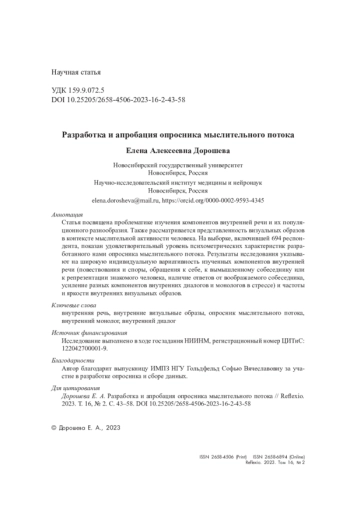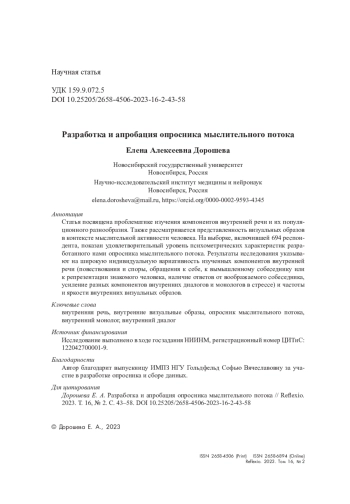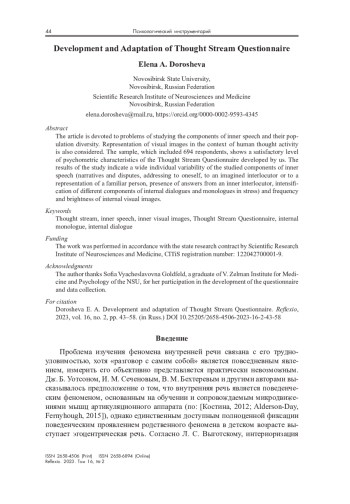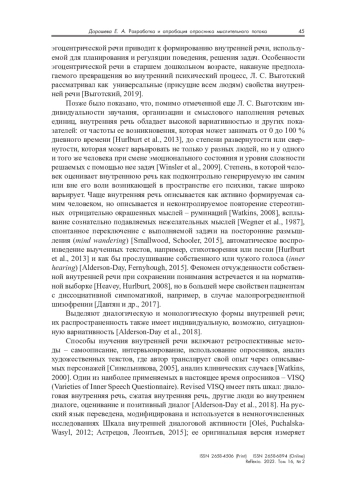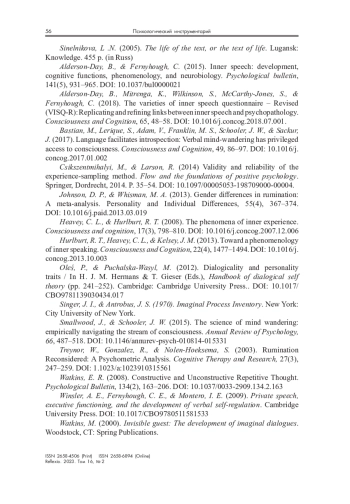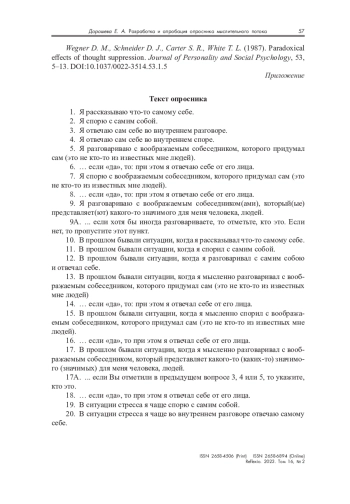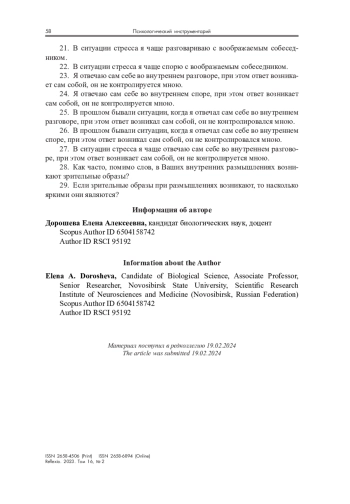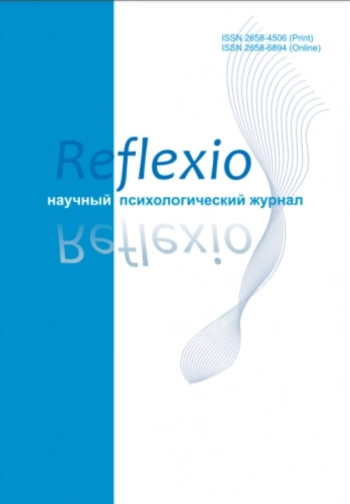Статья посвящена проблематике изучения компонентов внутренней речи и их популяционного разнообразия. Также рассматривается представленность визуальных образов в контексте мыслительной активности человека. На выборке, включившей 694 респондента, показан удовлетворительный уровень психометрических характеристик разработанного нами опросника мыслительного потока. Результаты исследования указывают на широкую индивидуальную вариативность изученных компонентов внутренней речи (повествования и споры, обращения к себе, к вымышленному собеседнику или к репрезентации знакомого человека, наличие ответов от воображаемого собеседника, усиление разных компонентов внутренних диалогов и монологов в стрессе) и частоты и яркости внутренних визуальных образов.
Идентификаторы и классификаторы
- Префикс DOI
- 10.25205/2658-4506-2023-16-2-43-58
Как и в предшествующих работах, было выявлено значительное разнообразие частоты встречаемости различных элементов внутренней речи у участников исследования. Например, 23,4 % респондентов рассказывают что-то самому себе очень часто, примерно половина (51,1 %) – часто или иногда, четверть участников (25,5 %) – очень редко или никогда. Споры с самим собой представлены в меньшей степени, чем разговоры: 12,0 % участников выборки спорят сами с собой очень часто, чуть меньше половины (45,4 %) – часто или хотя бы иногда, остальные (42,6 %) – очень редко или вообще никогда.
Список литературы
1. Астрецов Д. А., Леонтьев Д. А. Психодиагностические возможности «Шкалы внутренней диалоговой активности» П. Олеся // Вестник Московского университета. Серия 14: Психология, 2015. № 4. C. 66-82.
2. Выготский Л. С. Лекции по психологии. Мышление и речь. М.: Юрайт, 2019. 432 с.
3. Давтян Е. Н., Ильичев А. Б., Давтян С. Э. Симптом диалогического расщепления «я» как начальный этап нарушения внутренней речи при шизофрении // Психиатрия и психофармакотерапия, 2017. Т. 19, № 6. С. 62-70.
4. Дорошева Е. А. Адаптация русскоязычной версии опросника подавления нежелательных мыслей (White Bear Suppression Inventory) // Сибирский психологический журнал. 2024. № 91. С. 22-38. https://doi.org/10.17223/17267080/91/2
5. Дорошева Е. А., Князев Г. Г. Психометрические свойства трех опросников регуляции эмоций // Материалы научной конференции «Современные проблемы клинической психологии и психологии личности», 2017. С. 193-198.
6. Костина И. Б. Внутренняя речь как форма перехода непроизвольного понимания в свободное владение языком // Epistemology & Philosophy of Science, 2012. № 3. С. 130-143.
7. Синельникова Л. Н. Жизнь текста, или Текст жизни. Луганск: Знание, 2005. 455 с.
8. Alderson-Day B., Fernyhough C. Inner speech: development, cognitive functions, phenomenology, and neurobiology // Psychological bulletin. 2015. Т. 141. №. 5. С. 931-965. https://doi.org/10.1037/bul0000021
9. Alderson-Day B., Mitrenga K., Wilkinson S., McCarthy-Jones S., Fernyhough C. The varieties of inner speech questionnaire - Revised (VISQ-R): Replicating and refining links between inner speech and psychopathology // Consciousness and Cognition, 2018. № 65. P. 48-58. https://doi.org/10.1016/j.concog.2018.07.001.
10. Bastian M., Lerique S., Adam V., Franklin M. S., Schooler J. W., Sackur J. Language facilitates introspection: Verbal mind-wandering has privileged access to consciousness // Consciousness and Cognition, 2017. V. 49. P. 86-97. https://doi.org/10.1016/j.concog.2017.01.002
11. Csikszentmihalyi M., Larson R. Validity and reliability of the experiencesampling method //Flow and the foundations of positive psychology. Springer, Dordrecht, 2014. P. 35-54. https://doi.org/10.1097/00005053-198709000-00004.
12. Johnson D. P., Whisman M. A. Gender differences in rumination: A metaanalysis // Personality and Individual Differences, 2013. V. 55. I. 4. P. 367-374. https://doi.org/10.1016/j.paid.2013.03.019
13. Heavey C. L., Hurlburt R. T. The phenomena of inner experience // Consciousness and cognition, 2008. V. 17, №. 3. P. 798-810. https://doi.org/10.1016/j.concog.2007.12.006
14. Hurlburt R. T., Heavey C. L., Kelsey J. M. Toward a phenomenology of inner speaking // Consciousness and Cognition, 2013. V. 22, №. 4. P. 1477-1494. https://doi.org/10.1016/j.concog.2013.10.003
15. Oleś P., Puchalska‐Wasyl M. Dialogicality and personality traits / In H. J. M. Hermans & T. Gieser (Eds.), Handbook of dialogical self theory. Cambridge: Cambridge University Press, 2012. P. 241-252. https://doi.org/10.1017/CBO9781139030434.017
16. Singer J. I., Antrobus J. S. Imaginal Process Inventory. New York: City University of New York, 1970. 30 p.
17. Smallwood J., Schooler J. W. (2015).The science of mind wandering: empirically navigating the stream of consciousness // Annual Review of Psychology, 2015. № 66. P. 487-518. https://doi.org/10.1146/annurev-psych-010814-015331
18. Treynor W., Gonzalez R., Nolen-Hoeksema S. Rumination Reconsidered: A Psychometric Analysis // Cognitive Therapy and Research, 2003. V. 27. № 3. P. 247-259. https://doi.org/1.1023/a:1023910315561
19. Watkins E. R. Constructive and Unconstructive Repetitive Thought // Psychological Bulletin, 2008. V. 134. №. 2. P. 163-206. https://doi.org/10.1037/0033-2909.134.2.163
20. Winsler A. E., Fernyhough C. E., Montero I. E. Private speech, executive functioning, and the development of verbal self-regulation. Cambridge University Press, 2009. https://doi.org/10.1017/CBO9780511581533
21. Watkins M. Invisible guest: The development of imaginal dialogues. Woodstock, CT: Spring Publications, 2000. 207 p.
22. Wegner D. M., Schneider D. J., Carter S. R., White T. L. Paradoxical effects of thought suppression // Journal of Personality and Social Psychology, 1987. № 53. P. 5-13. https://doi.org/10.1037/0022-3514.53.1.5.
Выпуск
Другие статьи выпуска
Статья посвящена анализу психометрических характеристик шкалы конформности Mehrabian и Stelf (1995). На сегодняшний день на русском языке отсутствуют методики, которые позволяли бы оценивать степень конформности. Одной из таких методик, позволяющих оценивать степень конформности, является шкала, разработанная Mehrabian и Stelf (1995). Конформность они определяют как готовность идентифицировать себя с другими и подражать им, уступать другим, чтобы избежать конфликта, быть скорее последователем, а не лидером с точки зрения идей, ценностей и поведения. В нашем исследовании приняли участие 287 человек в возрасте от 18 до 55 лет (72 мужчины и 215 женщин), из них 30 человек приняли участие в дополнительном исследовании, направленном на оценку ретестовой надежности. Было показано, что русскоязычная версия шкалы конформности Mehrabian и Stelf обладает конвергентной и дискриминантной валидностью, удовлетворительной надежностью по внутренней согласованности, но слабой ретестовой надежностью. В результате анализа внутренней структуры шкалы было показано, что однофакторная модель, предложенная авторами методики, демонстрирует хорошее соответствие данным. Двухфакторная модель, в которой прямые и обратные пункты нагружены на разные факторы, продемонстрировала отличное соответствие данным. Такой результат, однако, может быть связан с самой формулировкой прямых и обратных пунктов, а не с природой исследуемого конструкта. Сравнение групп мужчин и женщин по показателю конформности не выявило различий, что свидетельствует в пользу универсальной природы данного феномена. Дальнейшие направления исследований могут включать анализ других видов валидности, а также быть направлены на улучшение ретестовой надежности.
В статье рассматриваются особенности применения схема-терапии при лечении депрессивных расстройств. Схема-терапия является одним из направлений «третьей волны» когнитивно-поведенческой терапии, демонстрирующим значительную эффективность в лечении хронических аффективных расстройств, включая депрессию. Систематический обзор литературы позволяет осветить теоретическую базу схема-терапии, включая понятия ранних дезадаптивных схем и режимов, а также методы работы с ними для устранения симптомов депрессии. В статье синтезированы данные о эффективности схема-терапии в уменьшении проявлений депрессии, улучшении эмоциональной регуляции и повышении устойчивости лиц, страдающих этим заболеванием. Также описаны потенциальные преимущества и ограничения данного метода. В заключении изложены практические аспекты применения схема-терапии, подходящие категории пациентов и перспективы будущих исследований в контексте повышения ее эффективности и адаптации в клинической практик.
Работа посвящена исследованию взаимосвязи между уровнем развития способностей к познанию, управлению эмоциями и особенностями субъективного восприятия событий. В исследовании принимали участие 80 человек (46 женщин и 34 мужчины). Для сбора эмпирического материала были использованы: Шкала эмоционального отклика, дифференциальная анкета атрибутивных измерений, краткий опросник оптимистического атрибутивного стиля, тест социального интеллекта, опросник эмоционального интеллекта. Для обработки данных был использован корреляционный анализ. Была выявлена значимая положительная связь между оптимистическим атрибутивным стилем и некоторыми аспектами эмоционального интеллекта, в то время как ожидаемые связи с социальным интеллектом обнаружены не были.
В статье поднимается проблема развития пространственного мышления у школьников на уроках технологии. Актуальность подчеркивается важностью внедрения в учебный процесс методов и технологий объемного моделирования, способствующих активному развитию пространственного мышления учащихся. Развитию пространственного мышления способствуют разнообразные виды и техники работы с различными материалами и информационными технологиями. Лепка, моделирование, конструирование, объемные композиции из различных художественных материалов, используемые на уроках технологии в общеобразовательной школе, способствуют более эффективному формированию пространственного мышлении, воображения. Поставленная в статье проблема решает важную стратегическую задачу в образовательном процессе.
В статье дается психолого-педагогическое обоснование формирования цветового восприятия у школьников на уроках изобразительного искусства в общеобразовательной школе. Обосновывается необходимость создания объективных условий для формирования основ цветового восприятия в процессе занятий живописью с учениками младших, средних и старших классов. В статье подчеркивается особая актуальность осмысления проблемы мотивации детей в освоении цветоведения, колористики, характеристики и качества цвета. Рассматриваются упражнения и задания как теоретического характера, так и практическое решение задач формирования цветовосприятия у обучающихся. Методические рекомендации, представленные в статье, позволяют обеспечить эффективное формирование живописных качеств у школьников. Очевидно, что поставленная в статье проблема помогает учителям изобразительного искусства решать проблему в представленном ключе.
Статья посвящена изучению специфики функционирования когнитивной сферы у лиц с выраженными аутистическими тенденциями через призму когнитивно-стилевого подхода, обеспечивающего более целостный взгляд на проблему организации познавательной деятельности при расстройствах аутистического спектра, нежели рассмотрение исключительно в терминах выявляемых дефицитов. Результаты проведенного эмпирического исследования свидетельствуют о наличии прямых связей между выраженностью различных аспектов аутистических проявлений и такими полюсами когнитивных стилей, как поленезависимость, ригидный познавательный контроль, рефлективность, конкретная концептуализация и узкий диапазон эквивалентности; вопросы о связи аутистических тенденций с толерантностью к нереалистическому опыту, а также о принадлежности к полюсу аналитичности или холистичности требуют уточнений. В целом полученные данные согласуются с теорией слабой центральной когерентности, предполагая фрагментарность познавательного «поля» у лиц с выраженными аутистическими чертами, сопровождающуюся высокой ригидностью, дихотомическим мышлением, тенденцией к построению конкретных ментальных репрезентаций и независимостью от контекста.
Статистика статьи
Статистика просмотров за 2025 - 2026 год.
Издательство
- Издательство
- Новосибирский Государственный Университет
- Регион
- Россия, Новосибирск
- Почтовый адрес
- 630090, Новосибирская область, г. Новосибирск, ул. Пирогова, д. 1.
- Юр. адрес
- 630090, Новосибирская область, г. Новосибирск, ул. Пирогова, д. 1.
- ФИО
- Федорук Михаил Петрович (Руководитель)
- E-mail адрес
- rector@nsu.ru
- Контактный телефон
- +7 (383) 3634000
- Сайт
- https://www.nsu.ru/
